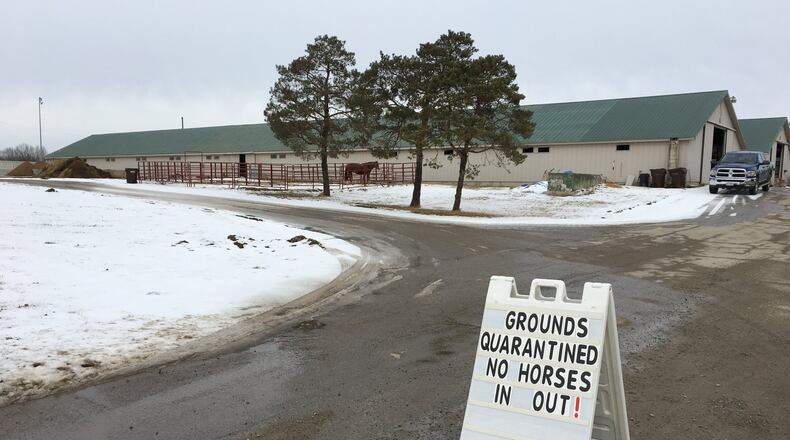RELATED: Horse that raced at Warren County racino tested positive for horse herpes
Still, Miami Valley Gaming in Warren County is expected to hold racing — events were to begin Friday night — using horses from other locations in the region not under quarantine.
“You’re not going to get it under control unless they shut down Miami Valley for 21 days,” horse owner James Schulte said during a meeting Friday at the fairgrounds in Lebanon. “This is a major epidemic.”
The American Association of Equine Practitioners recommends a minimum of 21 days in quarantine.
State officials advise against moving horses because of the growing number of horses testing positive.
“We want owners to move their horses as little as possible,” said Mark Bruce, a spokesman for the Ohio Department of Agriculture. “Every time you do, you’re putting your horse at risk.”
However, Bruce said the state could not prevent the movement of horses necessary to pull off the harness racing meet at the track at the racino in Turtlecreek Twp., just east of the Ohio 63 interchange at Interstate 75.
“Our actions are in step with those taken in nearby states, especially for a virus that does not pose a threat to human health,” Bruce added in an email.
Miami Valley Racing released a statement Friday:
“After serious deliberation and research, Miami Valley Gaming & Racing has decided to continue racing despite the fact that we will expect over 100 scratches this weekend due to the unfortunate Lebanon quarantine. We have been and will continue to work directly with the Ohio Department of Agriculture and Ohio Harness Horsemen’s Association regarding the Equine Herpes Virus situation.”
The first line was also part of a text message sent to trainers, owners and others connected to the race meet at the track operating in conjunction with the racino.
The “scratches” reference comes from the horses on the race cards for the meet that are barred from the races by the quarantine.
The racing moved from the fairgrounds in Lebanon to the Miami Valley Racing complex after racinos were legalized in Ohio. But many of the owners racing at the new location stable their horses at the fairgrounds.
MORE: Grandstands demolished for event center
At Friday’s meeting in Lebanon, horsemen warned that a big part of the problem with preventing the spread of horse herpes was with horses claimed in races outside the state, but then brought into Ohio — like Endeavor’s Pride, the horse brought in after being claimed at the Meadow Track in Pennsylvania.
They also indicated the problem had turned up in other surrounding states and warned a failure to stop its spread could have wide-ranging implications for the horse industry and beyond.
“This could affect the Triple Crown,” Schulte said.
Jerry Abner, spokesman for Miami Valley Gaming, declined to comment on a statement by Dr. Heather Plum, a local veterinarian at the meeting in Lebanon, that “it was recommended” that Miami Valley Gaming cancel the race meet.
Last week, the state said positive tests had been received on four horses at separate locations around the state, including Endeavor’s Pride, which had raced at Miami Valley Gaming in Warren County twice in January.
The quarantine in Lebanon was called this week after another horse at the fairgrounds, “Believe in the Spirit,” tested with a score high enough to indicate it was “shedding” the virus, Bruce said Friday.
MORE: Harness driver at Hollywood Dayton Raceway overcame adversity
”It’s producing virus that can be contracted by other animals,” he said.
The quarantine could end in 14 days, after “Believe in the Spirit” is retested, officials said.
But Dr. Rick Rothfuss, a veterinarian from Grove City, said at the Lebanon at the meeting that other cases could develop, extending the quarantine in 21-day multiples.
So far, six quarantines have been reported in Ohio due to positive tests for the virus, according to Bruce.
Horses at the University of Findlay farm are under quarantine, but not due to exposure to Endeavor’s Pride, the horse from Pennsylvania believed to have originally carried the virus into Ohio.
In addition, horses were in quarantine at a building at the veterinary college at The Ohio State University in Columbus, a stable in Ross County and the Tuscarawas County Fairgrounds, Bruce said.
The Larry Finn Stable outside Xenia, where Endeavor’s Pride, was stabled, remained under quarantine, he said.
However, Bruce said there had been “no other serious clinical signs.”
EHV can spread quickly from horse to horse and can cause three different forms of disease: rhinopneumonitis (a respiratory disease of mostly young horses), abortions in pregnant mares, and the neurologic disease EHV-1 myeloencephalopathy, which can be fatal to horses.
“Everything so far in the State of Ohio has not shown up neurological,” Rothfuss said.
EHV can be spread through the air or by contaminated clothing and equipment. It’s important that horse owners practice strict biosecurity measures in order to protect their animals and prevent any further spread of the disease. Veterinarians may submit nasal swab samples to the ODA’s Animal Disease Diagnostic Laboratory for testing.
“Every state is different how they handle it,” Plum said.
About the Author

